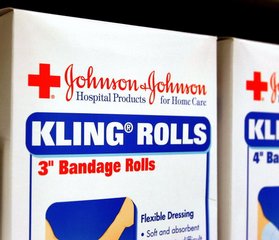
The European Commission has commenced a competition inquiry into Johnson & Johnson's planned acquisition of Pfizer's consumer health interests.
The Commission's Competition Directorate will decide at the end of next month whether the sale can proceed or whether a full-scale investigation is warranted. If the latter route is taken, this will delay the process by a further 90 days.
The proposed deal was announced in June this year and will result in Johnson & Johnson having a substantial monopoly over consumer health products. Jonathan Todd, speaking for the Commission's Competition Directorate, was quoted in an article in The Times saying, "Our concern is whether or not there may be an adverse effect on consumers, pricing and competition."
Earlier this month it was reported that US anti-trust regulators forced Johnson & Johnson and Pfizer to agree to sell Zantac (to Boehringer-Ingelheim Pharmaceuticals, for US$509.5M), after there were concerns that this product overlapped with some Pfizer products.
Meanwhile, as reported in the Financial Times last week, Lloydspharmacy has asked the Office of Fair Trading (OFT) in the UK to investigate Pfizer's exclusive agreement with UniChem to act as a single distributor for its drugs in the UK. UniChem is part of Alliance Boots, which also runs the large rival pharmacy chain, Boots.
Pfizer cla
 ims that the deal is to control the supply chain in a fight against counterfeit drugs, but after the expiration of patent protection for several of its key sellers - including Zythromax (antibiotic), Diflucan (antifungal), and Zoloft (antidepressent) - the agreement seems to be equally about limiting competition from cheaper, generic versions. Other British pharmacies and drug distributors are concerned that this will lead to an anti-competitive monopoly, adversely affecting consumers with higher prices. According to a recent report in the Financial Times, Pfizer's drugs account for around 15% of the UK's £10.3 billion pharmaceutical market. Furthemore, pharmacies will be forced to use UniChem as the exclusive provider of Pfizer's branded drugs, leading to concerns that Pfizer will be able to control the discounts available to retailers as well.
ims that the deal is to control the supply chain in a fight against counterfeit drugs, but after the expiration of patent protection for several of its key sellers - including Zythromax (antibiotic), Diflucan (antifungal), and Zoloft (antidepressent) - the agreement seems to be equally about limiting competition from cheaper, generic versions. Other British pharmacies and drug distributors are concerned that this will lead to an anti-competitive monopoly, adversely affecting consumers with higher prices. According to a recent report in the Financial Times, Pfizer's drugs account for around 15% of the UK's £10.3 billion pharmaceutical market. Furthemore, pharmacies will be forced to use UniChem as the exclusive provider of Pfizer's branded drugs, leading to concerns that Pfizer will be able to control the discounts available to retailers as well.James Harding, in an opinion piece in the The Times, suggests that public scrutiny will exonerate Pfizer, but he is correct to note that important questions being asked, "Is Pfizer just hyping up the counterfeits argument in order to cut out competition and take control of pricing?" and "Will UniChem provide as reliable a service to other pharmacies as it does to its own Boots stores?" In other words, the Pfizer-UniChem agreement will in effect control each level of the chain, right down to the deals with individual retailers themselves. By "taking a risk," Harding seems to think Pfizer is exonerated. But surely that is the nature of the entrepreneurial business models - taking risks pays much higher dividends. It is not clear that the risk of Pfizer grazing a knee if UniChem stumbles will be a sufficient check and balance against the potentially anti-competitive nature of this deal.
The British Association of Pharmaceutical Wholesalers (BAPW), the main trade body in the UK, is likely to make a similar complaint with the OFT. The Chairman of BAPW, Ian Brown
 lee, said to The Times, "With a single supplier the delivery system cannot ensure that pharmaceutical products are there in the dispensary when they are needed. Profit is being put before patient safety with a breathtaking arrogance." UniChem is one of its members.
lee, said to The Times, "With a single supplier the delivery system cannot ensure that pharmaceutical products are there in the dispensary when they are needed. Profit is being put before patient safety with a breathtaking arrogance." UniChem is one of its members.

1 comment:
It is very interesting to see the European perspective on these issues. I've written a lot about the EU in comparison to the US system.
Here's my take on the Pfizer deal from last month:
Pfizer's UK Deal: Change is Here!
Any thoughts on products being diverted/exported to the US?
Adam
Post a Comment